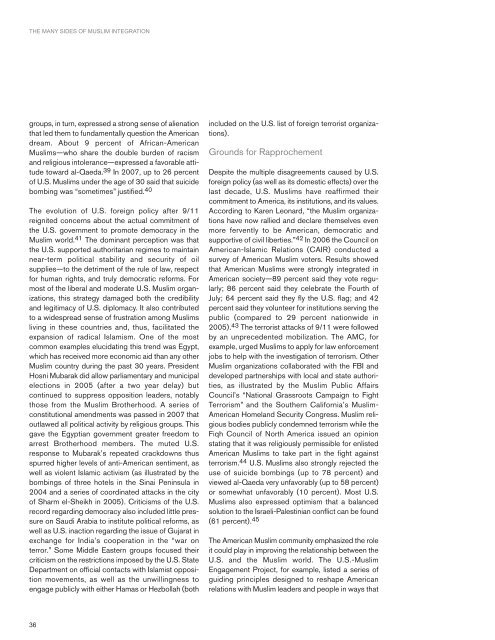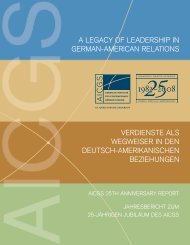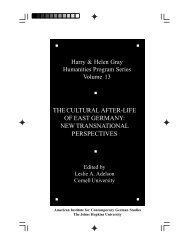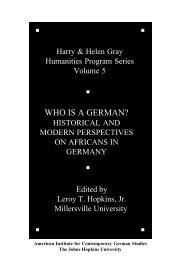the many sides of muslim integration: a german- american - aicgs
the many sides of muslim integration: a german- american - aicgs
the many sides of muslim integration: a german- american - aicgs
You also want an ePaper? Increase the reach of your titles
YUMPU automatically turns print PDFs into web optimized ePapers that Google loves.
<strong>the</strong> <strong>many</strong> <strong>sides</strong> <strong>of</strong> <strong>muslim</strong> <strong>integration</strong><br />
groups, in turn, expressed a strong sense <strong>of</strong> alienation<br />
that led <strong>the</strong>m to fundamentally question <strong>the</strong> American<br />
dream. About 9 percent <strong>of</strong> African-American<br />
Muslims—who share <strong>the</strong> double burden <strong>of</strong> racism<br />
and religious intolerance—expressed a favorable attitude<br />
toward al-Qaeda. 39 In 2007, up to 26 percent<br />
<strong>of</strong> U.S. Muslims under <strong>the</strong> age <strong>of</strong> 30 said that suicide<br />
bombing was “sometimes” justified. 40<br />
The evolution <strong>of</strong> U.S. foreign policy after 9/11<br />
reignited concerns about <strong>the</strong> actual commitment <strong>of</strong><br />
<strong>the</strong> U.S. government to promote democracy in <strong>the</strong><br />
Muslim world. 41 The dominant perception was that<br />
<strong>the</strong> U.S. supported authoritarian regimes to maintain<br />
near-term political stability and security <strong>of</strong> oil<br />
supplies—to <strong>the</strong> detriment <strong>of</strong> <strong>the</strong> rule <strong>of</strong> law, respect<br />
for human rights, and truly democratic reforms. For<br />
most <strong>of</strong> <strong>the</strong> liberal and moderate U.S. Muslim organizations,<br />
this strategy damaged both <strong>the</strong> credibility<br />
and legitimacy <strong>of</strong> U.S. diplomacy. It also contributed<br />
to a widespread sense <strong>of</strong> frustration among Muslims<br />
living in <strong>the</strong>se countries and, thus, facilitated <strong>the</strong><br />
expansion <strong>of</strong> radical Islamism. One <strong>of</strong> <strong>the</strong> most<br />
common examples elucidating this trend was Egypt,<br />
which has received more economic aid than any o<strong>the</strong>r<br />
Muslim country during <strong>the</strong> past 30 years. President<br />
Hosni Mubarak did allow parliamentary and municipal<br />
elections in 2005 (after a two year delay) but<br />
continued to suppress opposition leaders, notably<br />
those from <strong>the</strong> Muslim Bro<strong>the</strong>rhood. A series <strong>of</strong><br />
constitutional amendments was passed in 2007 that<br />
outlawed all political activity by religious groups. This<br />
gave <strong>the</strong> Egyptian government greater freedom to<br />
arrest Bro<strong>the</strong>rhood members. The muted U.S.<br />
response to Mubarak’s repeated crackdowns thus<br />
spurred higher levels <strong>of</strong> anti-American sentiment, as<br />
well as violent Islamic activism (as illustrated by <strong>the</strong><br />
bombings <strong>of</strong> three hotels in <strong>the</strong> Sinai Peninsula in<br />
2004 and a series <strong>of</strong> coordinated attacks in <strong>the</strong> city<br />
<strong>of</strong> Sharm el-Sheikh in 2005). Criticisms <strong>of</strong> <strong>the</strong> U.S.<br />
record regarding democracy also included little pressure<br />
on Saudi Arabia to institute political reforms, as<br />
well as U.S. inaction regarding <strong>the</strong> issue <strong>of</strong> Gujarat in<br />
exchange for India’s cooperation in <strong>the</strong> “war on<br />
terror.” Some Middle Eastern groups focused <strong>the</strong>ir<br />
criticism on <strong>the</strong> restrictions imposed by <strong>the</strong> U.S. State<br />
Department on <strong>of</strong>ficial contacts with Islamist opposition<br />
movements, as well as <strong>the</strong> unwillingness to<br />
engage publicly with ei<strong>the</strong>r Hamas or Hezbollah (both<br />
36<br />
included on <strong>the</strong> U.S. list <strong>of</strong> foreign terrorist organizations).<br />
Grounds for Rapprochement<br />
Despite <strong>the</strong> multiple disagreements caused by U.S.<br />
foreign policy (as well as its domestic effects) over <strong>the</strong><br />
last decade, U.S. Muslims have reaffirmed <strong>the</strong>ir<br />
commitment to America, its institutions, and its values.<br />
According to Karen Leonard, “<strong>the</strong> Muslim organizations<br />
have now rallied and declare <strong>the</strong>mselves even<br />
more fervently to be American, democratic and<br />
supportive <strong>of</strong> civil liberties.” 42 In 2006 <strong>the</strong> Council on<br />
American-Islamic Relations (CAIR) conducted a<br />
survey <strong>of</strong> American Muslim voters. Results showed<br />
that American Muslims were strongly integrated in<br />
American society—89 percent said <strong>the</strong>y vote regularly;<br />
86 percent said <strong>the</strong>y celebrate <strong>the</strong> Fourth <strong>of</strong><br />
July; 64 percent said <strong>the</strong>y fly <strong>the</strong> U.S. flag; and 42<br />
percent said <strong>the</strong>y volunteer for institutions serving <strong>the</strong><br />
public (compared to 29 percent nationwide in<br />
2005). 43 The terrorist attacks <strong>of</strong> 9/11 were followed<br />
by an unprecedented mobilization. The AMC, for<br />
example, urged Muslims to apply for law enforcement<br />
jobs to help with <strong>the</strong> investigation <strong>of</strong> terrorism. O<strong>the</strong>r<br />
Muslim organizations collaborated with <strong>the</strong> FBI and<br />
developed partnerships with local and state authorities,<br />
as illustrated by <strong>the</strong> Muslim Public Affairs<br />
Council’s “National Grassroots Campaign to Fight<br />
Terrorism” and <strong>the</strong> Sou<strong>the</strong>rn California’s Muslim-<br />
American Homeland Security Congress. Muslim religious<br />
bodies publicly condemned terrorism while <strong>the</strong><br />
Fiqh Council <strong>of</strong> North America issued an opinion<br />
stating that it was religiously permissible for enlisted<br />
American Muslims to take part in <strong>the</strong> fight against<br />
terrorism. 44 U.S. Muslims also strongly rejected <strong>the</strong><br />
use <strong>of</strong> suicide bombings (up to 78 percent) and<br />
viewed al-Qaeda very unfavorably (up to 58 percent)<br />
or somewhat unfavorably (10 percent). Most U.S.<br />
Muslims also expressed optimism that a balanced<br />
solution to <strong>the</strong> Israeli-Palestinian conflict can be found<br />
(61 percent). 45<br />
The American Muslim community emphasized <strong>the</strong> role<br />
it could play in improving <strong>the</strong> relationship between <strong>the</strong><br />
U.S. and <strong>the</strong> Muslim world. The U.S.-Muslim<br />
Engagement Project, for example, listed a series <strong>of</strong><br />
guiding principles designed to reshape American<br />
relations with Muslim leaders and people in ways that





